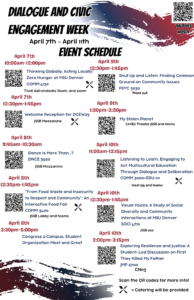Request Information
Ready to find out what MSU Denver can do for you? We’ve got you covered.
You can download a Dialogues Program Overview document here: Dialogues Program Overview (PDF).

Want to know more about Dialogues?
Please feel free to reach out to us with questions:
The Dialogues Program is a partnership between the Dean of Students Office & the Communication Studies Department.
Meet the Dialogues Team:
Dr. Christina Foust, Professor, Communication Studies | [email protected]
Dr. Elisa M. Varela, Assistant Professor, Communication Studies | [email protected]
Katia Campbell, Associate Dean, College of Letters, Arts & Sciences & Professor, Communication Studies | [email protected]
Elise Krumholz, Assistant Director, Restorative Justice & Student Conflict Resolution | [email protected]